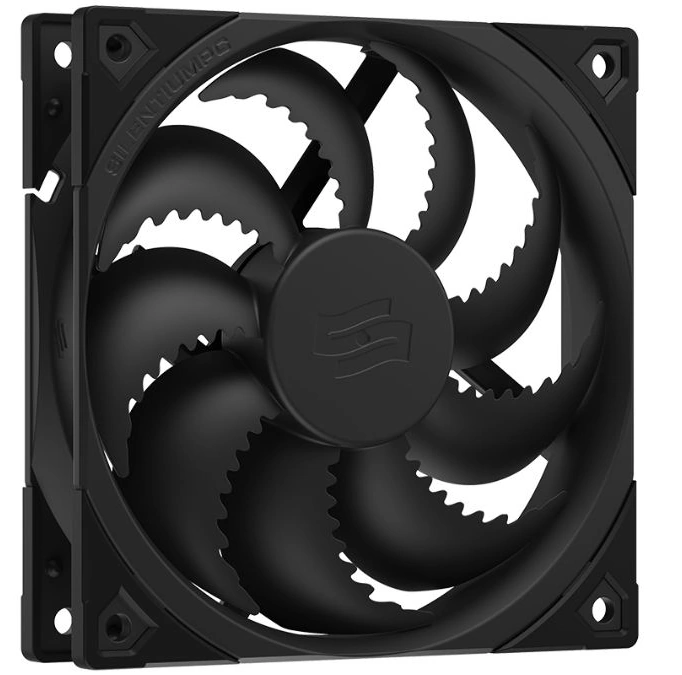The Fluctus 120 PWM fan seems to pack quite a lot of features but it's a bit puzzling that SilentiumPC doesn't share technical details. Basics like the airflow, noise level, and static pressure are all missing from the specifications list. The fan is sold online for 10.90EUR.
SilentiumPC, the European manufacturer of CPU coolers, Power Supply Units and PC cases, introduces the new Fluctus 120 PWM axial fan as a stand-alone product for the DIY market. The Fluctus 120 PWM fan is co-developed with Synergy Cooling and features high static pressure, very good airflow and excellent acoustics. It provides outstanding performance on dense water cooling radiators and in cases that are equipped with dust filters. A revamped, durable fluid dynamic bearing (FDB) with 100.000 h MTBF ensures high longevity, underlined by the 6-year manufacturer’s warranty.
Outstanding static pressure and performance
SilentiumPC Fluctus 120 PWM is equipped with a unique 9-bladed rotor with serrated leading edges. It provides high static pressure, which is required for creating good airflow through dense radiators of all-in-one water coolers. Users can expect a 1 to 3 °C reduction in temperatures compared to other fans commonly paired with AIO liquid coolers. In addition to that, the overall noise levels are decreased. Thanks to the wide speed regulation range from 300 (±100) to 1.800 (±10%) rpm makes Fluctus 120 PWM a perfect match for both bigger (360 mm) and smaller (240 mm, 120 mm) radiators, which usually requires higher fan speeds.
Thanks to all-round optimization, Fluctus 120 PWM can also create high airflow in less restricted applications, such as in cases with dense dust filters. Compared to other popular solutions, replacing intake fans with Fluctus 120 PWM can reduce video card and CPU temperatures by between 1 and 4 °C while reducing noise levels by up to half perceived loudness.
Psychoacoustic optimizations
Fluctus 120 PWM fans provide excellent acoustic performance thanks to technical improvements developed by Synergy Cooling. Serrated leading edges of the fan blades reduce prominent tonal noise, easily discernible over the acoustic background. It is the heart of Synergy Cooling’s patent-pending psychoacoustic optimization and makes Fluctus 120 PWM even more pleasant to the human ear than it is apparent from standard noise level measurements. All-axis vibration dampeners built into the fan frame reduce the risk of vibrations in adjacent elements without breaking compatibility with standard 120 mm fan placements.
Versatile PWM control
The speed of Fluctus 120 PWM fans can be controlled by the PWM signal in a wide range from 300 (±100) to 1.800 (±10%) rpm, making them suitable for various usage scenarios. Case fans, water cooling radiators and air coolers all require different fan speeds to reach a balance between performance and noise levels. Fluctus 120 PWM is ready for all of them. Enthusiasts can even create custom semi-passive cooling systems thanks to a fan stop feature: Fluctus 120 PWM automatically stops when PWM signal falls below 5% duty cycle and automatically restarts when it rises above 10%. The fan is equipped with a 4-pin power cable with a built-in splitter, allowing users to connect another fan to the same power and speed control source. Included 40 cm cable extension provides installation flexibility even in voluminous cases.
